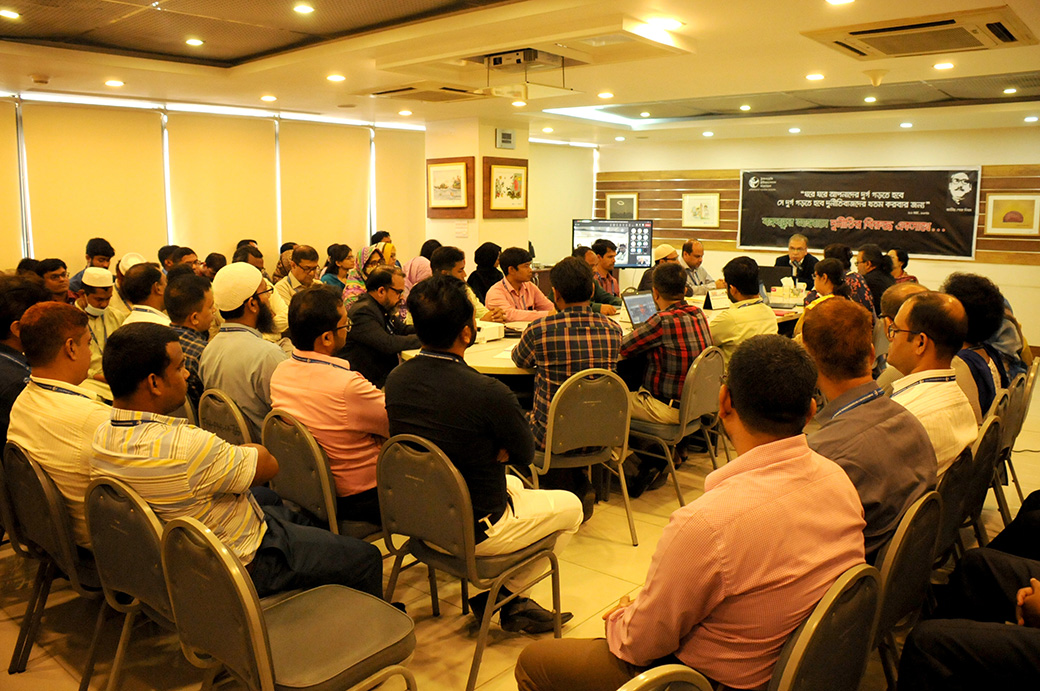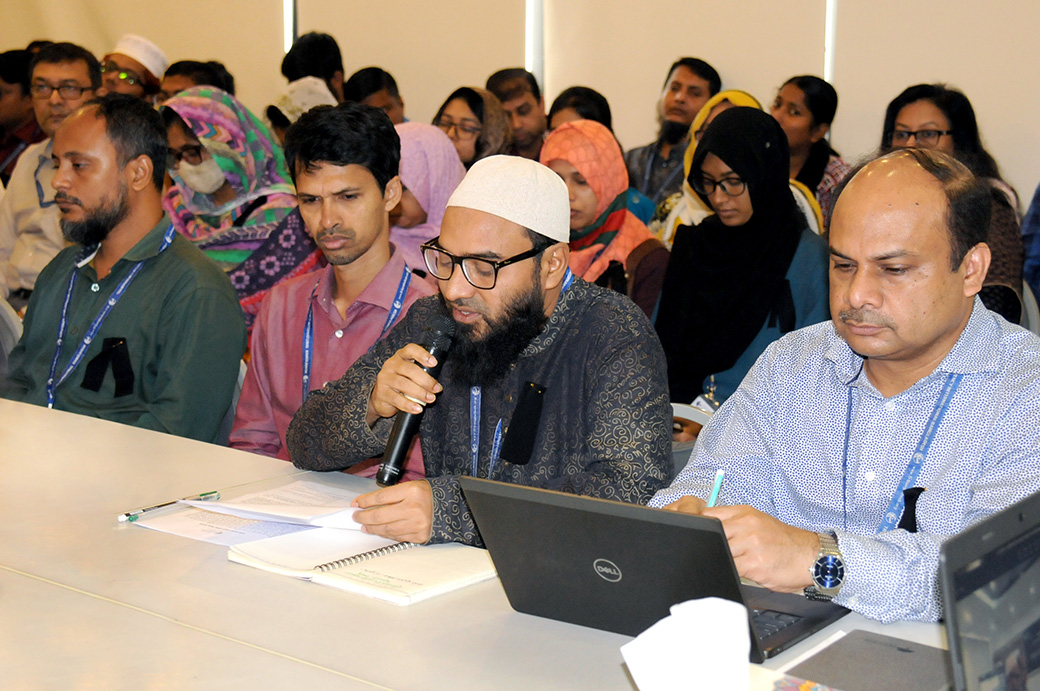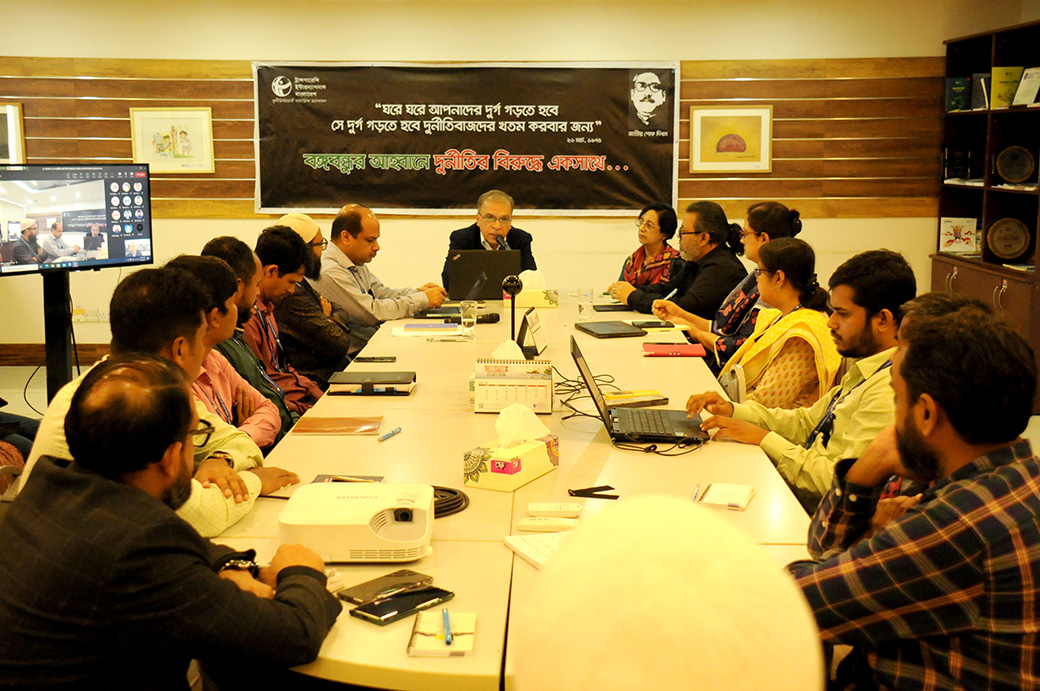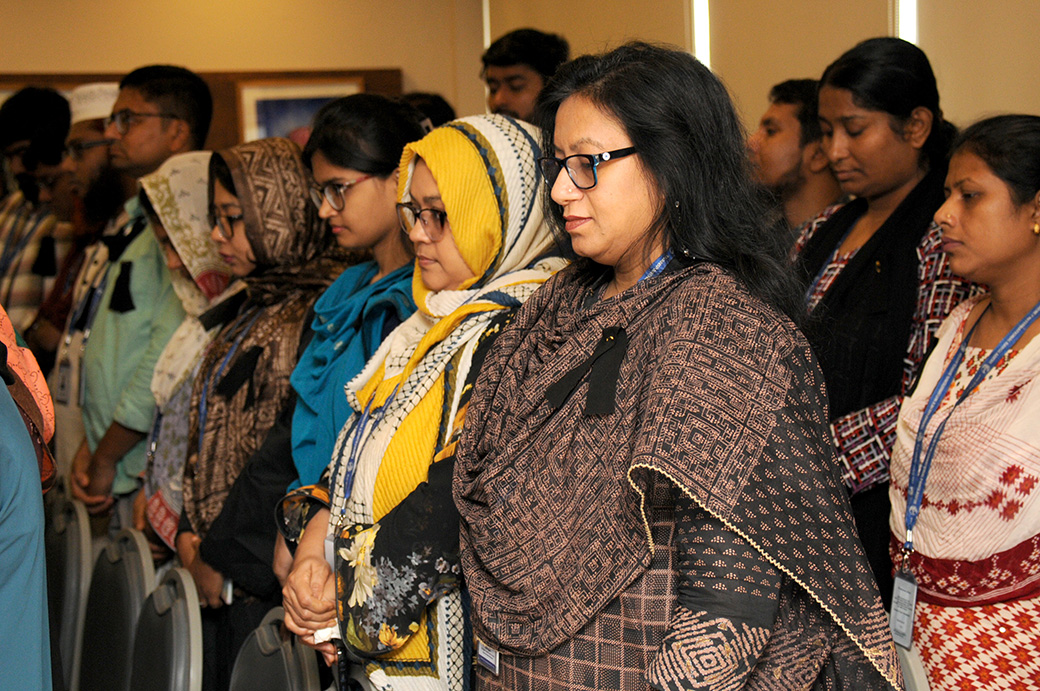Published: 14 August 2023

Bangabandhu's life was a testament to how to raise one's voice against injustice, irregularities, and corruption in all sectors of existence, serving as a wellspring of inspiration for everyone, as articulated by speakers at the Transparency International Bangladesh (TIB) office during a commemorative meeting marking the National Mourning Day.
Similar to TIB's emphasis on a social movement against corruption encompassing all, particularly the youth, Bangabandhu too emphasized the significance of social movements to counteract corruption, said speakers.
To mark the occasion, TIB organized the meeting titled 'The Anti-Corruption Social Movement: In the Spirit of Bangabandhu' across all its 45 working areas. The meeting was held, online & offline, for all staff members to mourn the death and honor the legacy of the Father of the Nation, Bangabandhu Sheikh Mujibur Rahman, who was brutally assassinated along with his family members in August 1975. Led by TIB's Executive Director Dr. Iftekharuzzaman, attendees held a moment of silence in honor of Bangabandhu. TIB Adviser Executive Management Sumaiya Khair, Research & Policy Director Muhammad Badiuzzaman, and Outreach & Communication Director Sheikh Manjur-E-Alam were present at the meeting.
Speaking at the meeting, TIB Executive Director, Dr. Iftekharuzzaman, said, “The tragic assassination of the founding father of the nation and his family stands as a unique instance of political murder, not solely within Bangladesh but on a global scale. This day is marked by sorrow, indignation, and a sense of shame. TIB's mission is rooted in opposing corruption. Throughout his life, Bangabandhu vehemently opposed corruption. He unequivocally condemned corruption during his student days, the era of Pakistan, and the period of independent Bangladesh. He issued directives and expressed firm convictions against corruption, yet regrettably, he was unable to see them through to implementation. Nevertheless, the example he left behind continues to serve as a wellspring of motivation for us.”
Dr. Zaman said, “Bangabandhu's political ideology knew no bounds, always resounding with strong anti-corruption sentiments that he voiced whenever he could. During a speech in 1975, he outlined his vision: Back in 1971, I advocated for fortifying every household; today, our priority is fortifying every home against corruption. I'll enact laws, sparing no one. But I can't do it alone... We need an anti-corruption social movement. He stressed that people from various professions would drive this movement, but notably, he urged the youth to lead and take charge.”

TIB's Executive Director outlined four essential components required to combat corruption: political resolve, accountability, institutional capability, and societal engagement. While the initial three are crucial, they alone are inadequate. Halting corruption necessitates active social movements, a venture dependent on public involvement. Consequently, entities like SANAK, YES, and ACG have been established to conduct on-the-ground anti-corruption endeavors, encompassing social movements. The Director likened this anti-corruption movement, founded on the four elements, to the spirit of Bangabandhu's speeches.
Dr. Zaman expressed profound dismay, saying, "Bangabandhu was, and is supposed to be, the indisputable and eternal symbol of our national unity. But unfortunately confrontational politics has turned him into a source of divide which is unwarranted and unacceptable. The political ideology, vision and practices of Bangabandhu are extremely vast and multi-dimensional, and encompass every aspect of statecraft. Outstanding from TIB perspective are the strategic directives he repeatedly and specifically pronounced against all forms of abuse of power, irregularities and corruption. We have failed as a nation to take the opportunity to mainstream Bangabandhu’s anti-corruption vision and strategic directions into statecraft and political and governance processes. As a result, corruption has flourished deep and wide. Many of those responsible to implement the incumbent Prime Minister’s oft-pronounced pledge of zero tolerance against corruption are ironically among beneficiaries, promoters and protectors of corruption’
TIB Research & Policy Director, Muhammad Badiuzzaman, said, "The enactment of the Indemnity Ordinance following Bangabandhu's assassination was a stark illustration of human rights violations, inequality, irregularities, and corruption. Throughout his life, Bangabandhu consistently engaged in the pursuit of justice. He never compromised with injustice. He demonstrated how to raise one's voice against unfairness, irregularities, and corruption, serving as an inspiration to us. From his involvement in Pakistan's politics to his engagement in Bangladesh's politics, he consistently emphasized the importance of the anti-corruption social movement throughout his political journey.”
TIB believes that the state has a role to play in encouraging the formation of social movements against corruption. The aim is to foster a conducive atmosphere for an impactful social movement, inspired by Bangabandhu's principles. However, instead of collaboration, there has been opposition. Expressing concerns over corruption and publishing reports are currently viewed as a 'source of threat’, which is unfortunate.

In observance of this day, TIB Dhaka and its 45 operational zones exhibited banners for National Mourning Day and wore black badges. They organized a commemorative meeting titled "The Anti-Corruption Social Movement: In the Spirit of Bangabandhu," which included members from Committees of Concerned Citizens (CCC), Youth Engagement and Support (YES), and Active Citizens’ Group (ACG). Additionally, various activities like essay writing, quizzes, artwork, and speech contests engaged young individuals and students. The TIB website featured the National Mourning Day banner, and the campaign "United Against Corruption on Bangabandhu's Call" was promoted across social media platforms.









